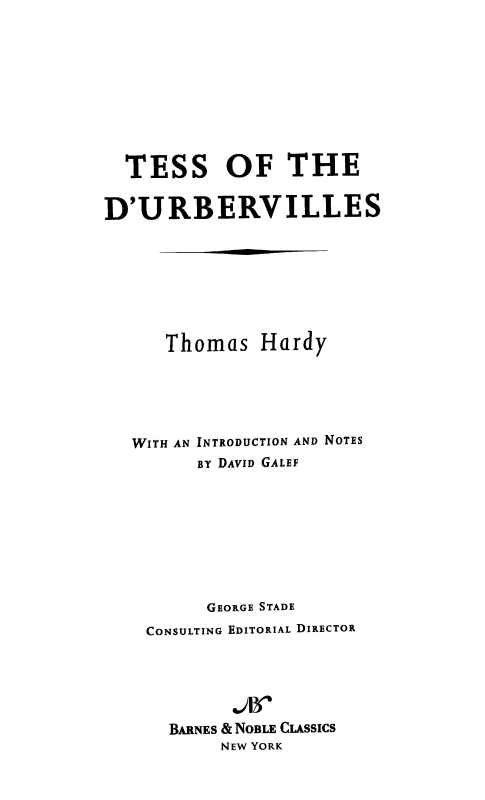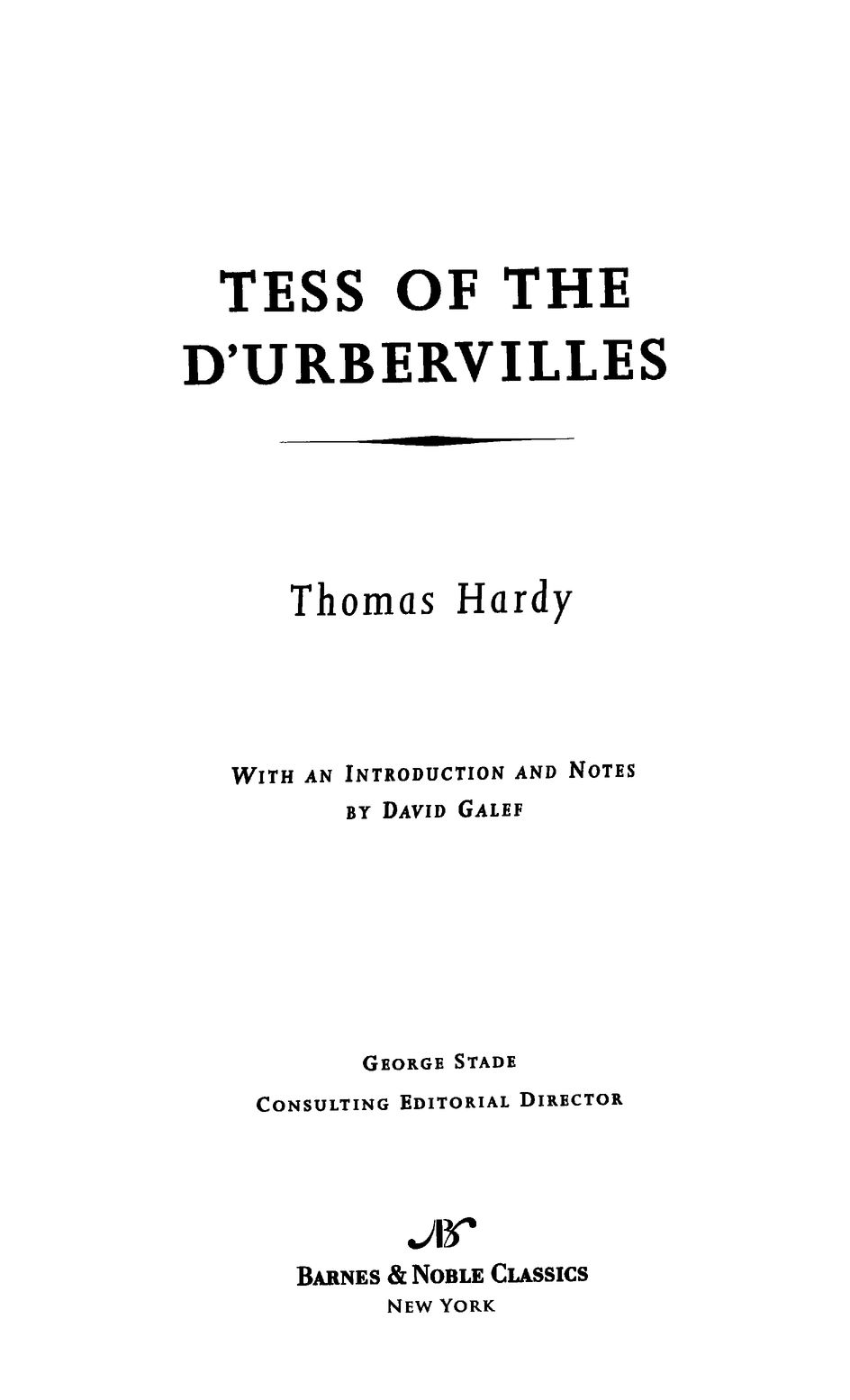
Table of Contents
FROM THE PAGES OF
TESS OF THE DURBERVILLES
Dont you really know, Durbeyfield, that you are the lineal representative of the ancient and knightly family of the dUrbervilles, who derive their descent from Sir Pagan dUrberville, that renowned knight who came from Normandy with William the Conqueror, as appears by Battle Abbey Roll?
(pages 11-12)
Tess Durbeyfield at this time of her life was a mere vessel of emotion untinctured by experience. The dialect was on her tongue to some extent, despite the village school: the characteristic intonation of that dialect for this district being the voicing approximately rendered by the syllable UR, probably as rich an utterance as any to be found in human speech. The pouted-up deep red mouth to which this syllable was native had hardly as yet settled into its definite shape, and her lower lip had a way of thrusting the middle of her top one upward, when they closed together after a word.
(page 21 )
You are mighty sensitive for a cottage girl!
(page 69)
She knew how to hit to a hairs-breadth that moment of evening when the light and the darkness are so evenly balanced that the constraint of day and the suspense of night neutralize each other, leaving absolute mental liberty. It is then that the plight of being alive becomes attenuated to its least possible dimensions. She had no fear of the shadows; her sole idea seemed to be to shun mankindor rather that cold accretion called the world, which, so terrible in the mass, is so unformidable, even pitiable, in its units.
(page 106)
Unexpectedly he began to like the outdoor life for its own sake, and for what it brought, apart from its bearing on his own proposed career. Considering his position he became wonderfully free from the chronic melancholy which is taking hold of the civilized races with the decline of belief in a beneficent Power.
(page 147)
She was no longer the milklnaid, but a visionary essence of womana whole sex condensed into one typical form.
(page 160)
The rosy-cheeked, bright-eyed quartet looked so charming in their light summer attire, clinging to the roadside bank like pigeons on a roof-slope, that he stopped a moment to regard them before coming close. Their gauzy skirts had brushed up from the grass innumerable flies and butterflies which, unable to escape, remained caged in the transparent tissue as in an aviary. Angels eye at last fell upon Tess, the hindmost of the four; she, being full of suppressed laughter at their dilemma, could not help meeting his glance radiantly.
(pages 174175)
I cant bear to let anybody have him but me! Yet it is a wrong to him, and may kill him when he knows!
(page 217)
Modern life stretched out its steam feeler to this point three or four times a day, touched the native existences, and quickly withdrew its feeler again, as if what it touched had been uncongenial.
(page 226)
I am only a peasant by position, not by nature!
(page 276)
In considering what Tess was not, he overlooked what she was, and forgot that the defective can be more than the entire.
(page 312)
You temptress, Tess; you dear damned witch of BabylonI could not resist you as soon as I met you again!
(page 377)
It is too late.
(page 442)

THOMAS HARDY
Thomas Hardy was born on June 2, 1840, in the village of Higher Bockhampton, near Dorchester, a market town in the county of Dorset. Hardy would spend much of his life in his native region, transforming its rural landscapes into his fictional Wessex. Hardys mother, Jemima, inspired him with a taste for literature, while his stonemason father, Thomas, shared with him a love of architecture and music (the two would later play the fiddle for local groups). As a boy Hardy read widely in the popular fiction of the day, including the novels of Scott, Dumas, Dickens, W. Harrison Ainsworth, and G. P. R. James, and in the poetry of Scott, Wordsworth, Byron, Shelley, Keats, and others. Strongly influenced in his youth by the Bible and the liturgy of the Anglican Church, Hardy later contemplated a career in the ministry; but his assimilation of the new theories of Darwinian evolutionism eventually made him an agnostic and a severe critic of traditional religion.
Although Hardy was a gifted student at the local schools he attended as a boy for eight years, his lower-class origins limited further educational opportunities. At sixteen, he was apprenticed to architect James Hicks in Dorchester and began an architectural career primarily focused on the restoration of churches. In Dorchester Hardy was also befriended by Horace Moule, eight years Hardys senior, who acted as an intellectual mentor and literary adviser throughout his youth and early adulthood. From 1862 to 1867, Hardy worked in London for the distinguished architect Arthur Blomfield, but he continued to studyliterature, art, philosophy, science, history, the classicsand to write, first poetry and then fiction.
In the early 1870s, Hardys first two published novels, Desperate Remedies and Under the Greenwood Tree, appeared to little acclaim or sales. With his third novel, A Pair of Blue Eyes, he began the practice of serializing his fiction in magazines prior to book publication, a method that he would use throughout his career as a novelist. In 1874, the year of his marriage to Emma Gifford of St. Juliot, Cornwall, Hardy enjoyed his first significant commercial and critical success with the book publication of Far from the Madding Crowd after its serialization in the Cornhill Magazine. Hardy and his wife lived in several locations in London, Dorset, and Somerset before settling in southwest London for three years in 1878. During the late 1870s and early 1880s, Hardy published The Return of the Native, The Trumpet-Major, A Laodicean, and Two on a Tower while consolidating his place as a leading English novelist. He would also eventually produce four volumes of short stories: Wessex Tales, A Group of Noble Dames, Lifes Little Ironies, and A Changed Man.
In 1883 Hardy and his wife moved back to Dorchester, where Hardy wrote The Mayor of Casterbridge, set in a fictionalized version of Dorchester, and went on to design and construct a permanent home for himself, named Max Gate, completed in 1885. In the later 1880s and early 1890s, Hardy wrote three of his greatest novels, The Woodlanders, Tess of the dUrbervilles, and Jude the Obscure, all notable for their remarkable tragic power. The last two were initially published as magazine serials in which Hardy removed potentially objectionable moral and religious content, only to restore it when the novels were published in book form; both serials nevertheless aroused public controversy for their criticisms of Victorian sexual and religious mores. In particular, the appearance of Jude the Obscure in 1895 precipitated harsh attacks on Hardys alleged pessimism and immorality. The attacks contributed to his decision to abandon the writing of fiction after the appearance of his last-published novel, The Well-Beloved.
In the later 1890s, Hardy returned to the writing of poetry that he had abandoned for fiction thirty years earlier. Wessex Poems appeared in 1898, followed by several volumes of poetry at regular intervals over the next three decades. Between 1904 and 1908 Hardy published a three-part epic verse drama, The Dynasts, based on the Napoleonic Wars of the early nineteenth century. Following the death of his first wife in 1912, Hardy married his literary secretary Florence Dugdale in 1914. Hardy received a variety of public honors in the last two decades of his life and continued to publish poems until his death at Max Gate on January 11, 1928.
Next page






